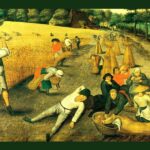Quote:
And so we can go to the wood, cut down trees and take what we want, take fish from the fish ponds and game from the forrests – we’ll have our will in the woods, the waters and the meadows.
Source:
Rodney Hilton (1973): Bond Men Made Free. Medieval Peasant Movements and the English Rising of 1381. New York: Viking Press Inc.
Author Bio:
An anonymous serf in a mid 12th century English chronicle. Serfdom developed in medieval Europe after the end of the enslavement of Europeans between the 5th and 7th centuries. Serfs were the property of their masters, but had more freedom than enslaved people and could use the commons of forests, lakes and meadows, etc.
Context:
 Despite their attachment to princes, serfs had a degree of independence, being able to support themselves from the commons. As part of the development of early capitalism in the 16th century, land was massively privatised (Federici 2014: 68, German edition). People became impoverished and dependent on the social systems created as early as 1530 (Federici 2014: 84). Land privatisation occurred all over the world: In the 16th century, European traders had “privatised” much of the Canary Islands and turned it into sugar plantations. In the Americas, by the beginning of the 17th century, a third of the common land used by Native Americans was already occupied by the Spaniards. (Federici 2014: 68). In their encomienda system, the inhabitants of the conquered country were awarded to the coloniser by the Spanish crown.
Despite their attachment to princes, serfs had a degree of independence, being able to support themselves from the commons. As part of the development of early capitalism in the 16th century, land was massively privatised (Federici 2014: 68, German edition). People became impoverished and dependent on the social systems created as early as 1530 (Federici 2014: 84). Land privatisation occurred all over the world: In the 16th century, European traders had “privatised” much of the Canary Islands and turned it into sugar plantations. In the Americas, by the beginning of the 17th century, a third of the common land used by Native Americans was already occupied by the Spaniards. (Federici 2014: 68). In their encomienda system, the inhabitants of the conquered country were awarded to the coloniser by the Spanish crown.Further Reading:
*Silvia Federici (2014): Caliban and the Witch: Women, the Body and Primitive Accumulation. New York: Automedia.
Year:
1150